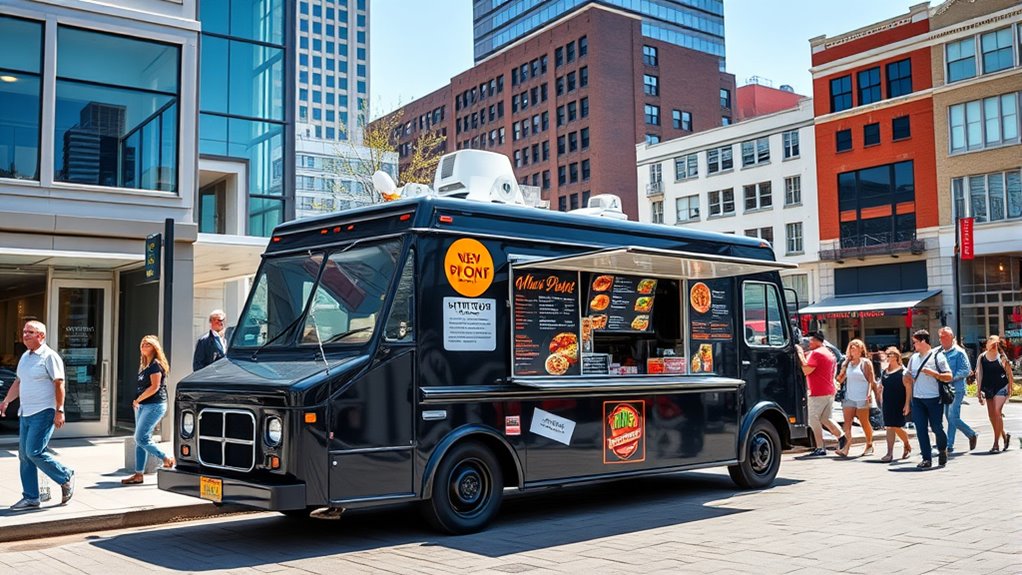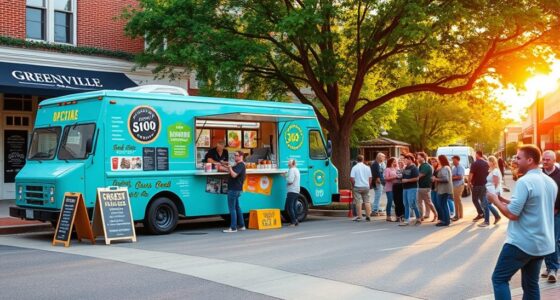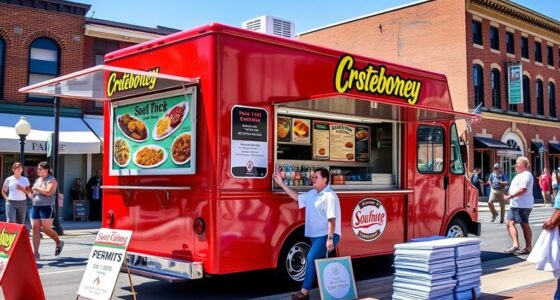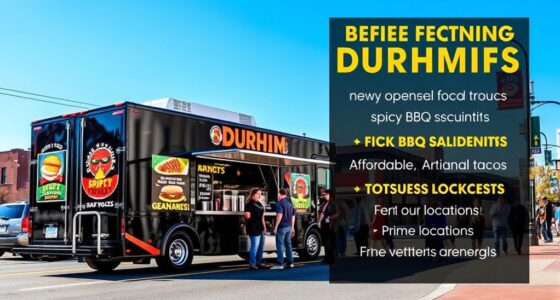To open a food truck in Stamford, CT, you’ll need permits from the Department of Health and city authorities, along with a Connecticut sales tax permit. Costs vary — trucks range from $44,000 to $100,000, and you’ll also budget for equipment, safety features, and insurance. Choose locations carefully, ensuring you have permits and comply with zoning laws. Focus on a safe, appealing menu and use social media and community events for marketing. Keep exploring for detailed steps to get started smoothly.
Key Takeaways
- Obtain necessary permits from the Stamford Department of Health and city authorities, including a Connecticut sales and use tax permit.
- Budget approximately $44,000 to $100,000 for truck purchase, equipment, safety systems, licensing, and initial inventory costs.
- Secure city permits for public street or land operation, and get approval for designated food truck areas from the Food Truck Committee.
- Develop a compliant menu focusing on safe storage and handling, avoiding high-risk ingredients, and documenting food safety protocols.
- Utilize social media, participate in local events, and implement targeted marketing strategies like loyalty programs to grow your customer base.
Navigating Permit Requirements and Application Processes

To operate a food truck in Stamford, you need to successfully navigate the permit requirements and application process. First, obtain a permit from the Stamford Department of Health before starting your business. You’ll also need a Connecticut sales and use tax permit, which is mandatory for your application. Your permit is valid for one year and isn’t transferable. Make sure to display your permit and any supplemental permits clearly on your vehicle. You’ll submit applications through the Cashiering and Permitting Department, including your personal details, business location, and vehicle information. Be prepared to provide proof of no recent felonies or sex offender registration. Additionally, you must pass health inspections and possibly review construction plans if you modify your truck. Staying compliant guarantees smooth operation and renewal each year. Understanding narcissistic behaviors may also help if you encounter challenging interactions during the permitting process or in your business relationships.
Understanding Costs and Fees for Your Food Truck Venture

Starting a food truck in Stamford involves significant upfront costs and ongoing fees that you need to budget carefully. The average new truck costs around $100,000, while used options range from $44,000 to $63,800. Equipment expenses vary: grills and fryers can cost $300–$2,500, ovens up to $5,000, and refrigeration systems between $1,000 and $3,500. Safety features like fire suppression systems may add another $2,000–$5,000+. Licensing fees, including business registration, permits, and health inspections, typically total around $1,864 but can be higher depending on specifics. Initial inventory costs range from $2,000 to $7,000, plus regular expenses for supplies, ingredients, and disposables. Don’t forget insurance, which can cost $2,800–$5,600 annually, along with maintenance and fuel costs. Additionally, understanding the regulatory requirements involved in operating a food truck is essential for compliance and smooth business operation.
Choosing Suitable Locations and Staying Compliant
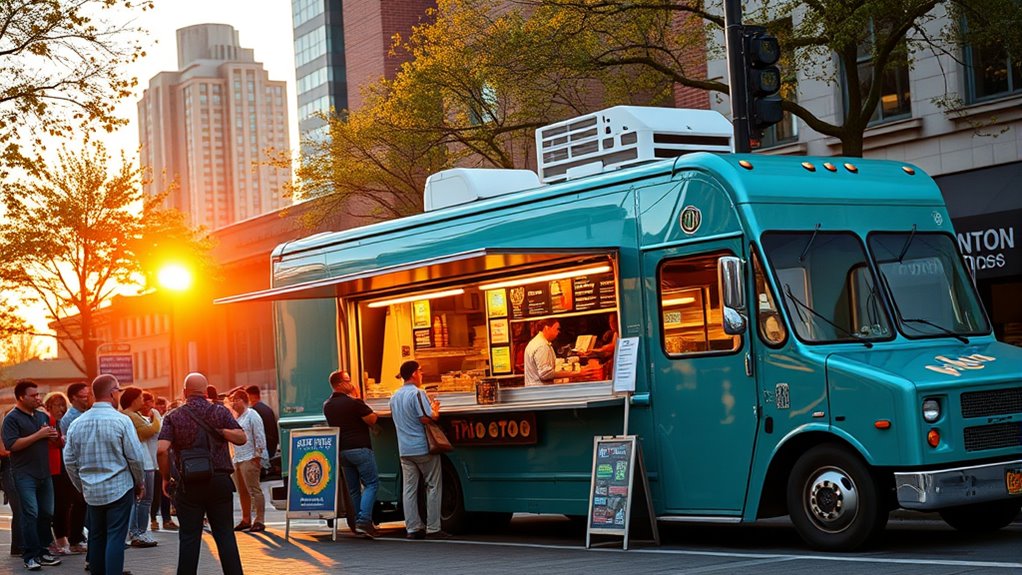
Choosing the right location for your food truck in Stamford requires careful attention to city regulations and safety considerations. You must obtain a city-issued permit to operate on public streets or lands, and these permits must be displayed prominently. Be aware that designated Food Truck Areas need approval and can be revoked by the Food Truck Committee (FTC). Zoning regulations may restrict where you can park, and the city is considering limits on the number of trucks and specific locations to ensure pedestrian safety. High-traffic sites can boost sales but may face stricter enforcement. Always guarantee your chosen spot complies with health and safety standards—register with the City Health Department, and consider sanitation access and waste disposal. Staying compliant helps avoid penalties and keeps your operation smooth. Utilizing low light office plants can improve your workspace environment and overall business atmosphere.
Developing a Menu That Meets Safety Standards
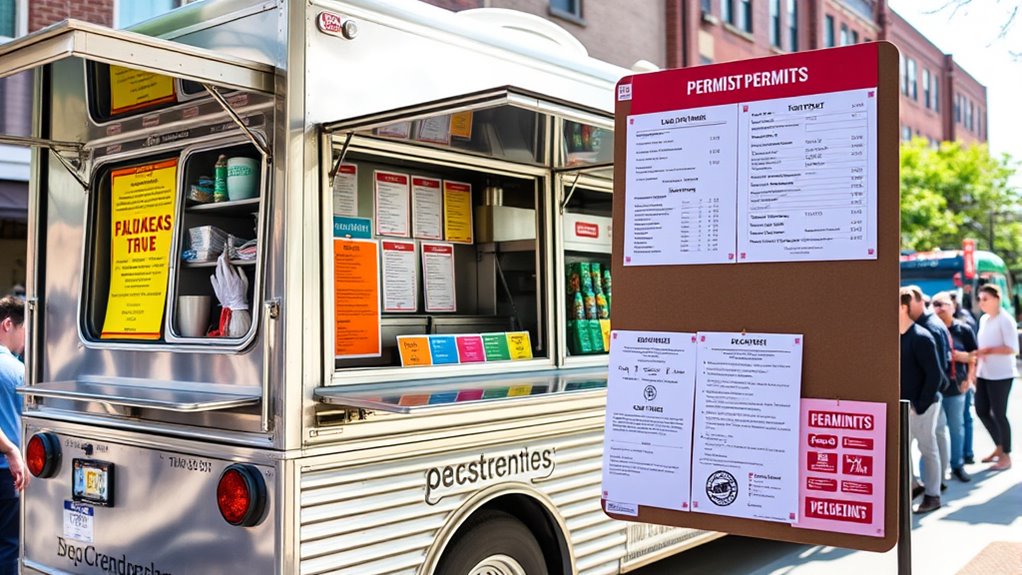
Developing a menu that meets safety standards is essential for operating a compliant and successful food truck in Stamford. Your menu should focus on foods that can be stored and served within regulated temperature controls to prevent hazards. Avoid or carefully handle high-risk ingredients like raw sprouts, cooked rice, and cut melons. Using commercial additives, such as processed mayonnaise, can reduce refrigeration risks. Be sure to document your menu clearly for health inspections and licensing approvals. Incorporating food safety protocols into your menu planning ensures compliance and helps protect your customers.
Effective Marketing Strategies to Grow Your Food Truck Business

To effectively grow your food truck business, leveraging social media platforms is essential, as they offer powerful tools for increasing visibility and engaging customers. About 68% of food truck owners use social media regularly for promotion, with Facebook being the most popular at 75%. Short-form videos on TikTok, Instagram Reels, and YouTube Shorts are crucial in 2025 for showcasing behind-the-scenes content, contests, and specials. Mobile apps that help customers locate trucks have boosted downloads by 35%. Additionally, 40% of customers discover their favorite trucks through social media ads. Participating in festivals and community events, which over 80% of trucks do annually, can also dramatically increase sales and brand recognition. Incorporating marketing strategies like targeted local advertising and loyalty programs can further enhance customer retention. Combining digital outreach with local presence is key to building loyal, engaged customers.
Frequently Asked Questions
How Long Does the Permit Approval Process Typically Take in Stamford?
You’re wondering how long the permit approval process usually takes. In Stamford, it typically ranges from 2 to 6 weeks, depending on how complete your application is and how quickly inspections are scheduled and passed. You’ll need to gather all required documents, coordinate with multiple city departments, and pass health and safety inspections. Staying organized and submitting accurate paperwork can help speed up the process.
Are There Any Specific Vehicle Size Restrictions for Food Trucks in Stamford?
You’re wondering if Stamford has specific size restrictions for food trucks. While the city doesn’t set explicit vehicle size limits, it emphasizes avoiding obstructions and ensuring safety. Your truck must comply with parking and weight restrictions, especially if it exceeds 12,000 pounds. Vehicle placement depends on designated areas and street regulations. Always verify your truck’s size and weight with local ordinances and registration requirements to stay compliant.
What Insurance Coverage Is Required for Operating a Food Truck in Stamford?
Imagine a customer slips and gets injured at your food truck. You’re responsible, so you need general liability insurance to cover medical bills and damages. In Stamford, you must prove you have auto insurance with minimum coverage, including bodily injury and property damage. Additionally, it’s wise to guarantee comprehensive coverage for theft or vandalism and workers’ compensation if you hire staff. Staying compliant ensures your business operates smoothly and avoids costly penalties.
Can I Operate My Food Truck at Private Events Without City Permits?
You can operate your food truck at private events without city permits in Stamford, but you still need to follow health and safety regulations. Make sure you have a valid health department permit and comply with state laws, including using a licensed commissary kitchen if required. Also, get permission from the event organizer and check if any venue-specific permits are needed. Proper insurance and adherence to local rules guarantee smooth operations.
Are There Restrictions on Serving Alcohol From a Food Truck in Stamford?
You can serve alcohol from your food truck in Stamford, but strict restrictions apply. You need separate liquor licenses, and alcohol can only be served to seated patrons eating substantial meals. You must operate in approved areas, follow zoning laws, and display permits clearly. Serving alcohol outside designated zones or without proper licensing risks fines or permit revocation. Always coordinate with local authorities to guarantee full compliance and avoid penalties.
Conclusion
Starting your food truck in Stamford is like planting a seed—you’ll need permits, a solid menu, and smart marketing to see it flourish. Keep your plans clear, stay compliant, and adapt as you grow. Picture your truck as a beacon of delicious aromas guiding hungry customers right to your door. With dedication and strategy, you’ll turn this vibrant city into your very own feast of success. Your culinary journey begins now—grab the wheel and steer toward greatness.
